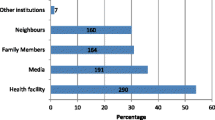Abstract
Objective
The study was conducted to evaluate the effect of breastfeeding counseling and breastfeeding support by trained counselors during the ante-natal period at health facility and postnatal period at home on breastfeeding practices during the first six months of life.
Design
This was a randomized controlled study that compared the effect of counseling on breastfeeding during the first 6 months of life.
Setting
study was done in a government medical college in northern India, which is situated in an urban area.
Participants
300 healthy pregnant women from an urban population attending the antenatal clinic at Jawaharlal Nehru Medical College, Aligarh Muslim University were recruited for the study.
Intervention
Subjects were equally assigned randomly to the intervention (2 antenatal and 8 postpartum home counseling visits by the counselors) and control (non-counseling) group.
Main Outcome Measures
Infant feeding practices including rates of initiation of the breastfeeding within one hour of birth; exclusive breastfeeding and bottle-feeding during the first 6 months of life.
Results
Initiation of breastfeeding within one hour of birth was 73.4% in intervention group as compared to 33.6% in control group (P=0.001). More mothers in the intervention group (88.1%) were able to sustain exclusive breastfeeding rates at 6 months of age in comparison to the control group (50%) (OR 7.44, 95% CI 3.98-13.92).
Conclusions
This study substantiates positive role of skilled counseling by a trained dedicated breastfeeding counselor during the antenatal and post-natal periods on breastfeeding practices during the first six months of life.
Similar content being viewed by others
References
National Health and Family Survey–4, 2015–16: India Fact Sheet. Ministry of Health and Family Welfare, Government of India. Available from: https://doi.org/rchiips.org/NFHS/pdf/NFHS4/India.pdf. Accessed December 17, 2017.
Leite AJ, Puccini RF, Atalah AN, Alves Da Cunha AL, Machado MT. Effectiveness of home–based peer counselling to promote breastfeeding in the northeast of Brazil: a randomized clinical trial. Acta Paediatr. 2005;94:741–6.
Britton C, McCormick FM, Renfrew MJ, Wade A, King SE. Support for breastfeeding mothers. Cochrane Database Syst Rev. 2007;24:CD001141.
The “4 in 1” Training Programme–Capacity building initiative for building health/nutrition workers’ skills in Infant and Young Child Feeding Counseling. Breastfeeding Promotion Network of India (BPNI), International Baby Food Action Network (IBFAN) Asia;Delhi, 2015. Available from: https://doi.org/bpni.org/Training/4-in-1-brochure.pdf. Accessed December 17, 2017.
World Health Organization. Indicators for assessing infant and young child feeding practices: part 1: definitions: conclusions of a consensus meeting held 6–8 November 2007 in Washington DC, USA. Available from: https://doi.org/apps.who.int/iris/bitstream/10665/43895/1/9789241596664_eng.pdf. Accessed August 25, 2017.
Haider R, Ashworth A, Kabir I, Huttly SR. Effect of community–based peer counsellors on exclusive breastfeeding practices in Dhaka, Bangladesh: A randomised controlled trial. Lancet. 2000;356:1643–7.
Sinha B, Chowdhury R, Sankar MJ, Martines J, Taneja S, Mazumder S, et al. Interventions to improve breastfeeding outcomes: A systematic review and meta–analysis. Acta Paediatr. 2015;104:114–34.
Liu L, Zhu J, Yang J, Wu M, Ye B. The effect of a perinatal breastfeeding support Program on Breastfeeding Outcomes in Primiparous Mothers. Western journal of nursing research. 2017;39:906–23.
Vural F, Vural B. The effect of prenatal and postnatal education on exclusive breastfeeding rates. Minerva Pediatr. 2017;69:22–9.
Ahmad MO, Sughra U, Kalsoom U, Imran M, Hadi U. Effect of antenatal counselling on exclusive breastfeeding. J Ayub Medical College Abbottabad. 2012;24:116–9.
Patel S, Patel S. The effectiveness of lactation consultants and lactation counselors on breastfeeding outcomes. J Human Lactation. 2016;32:530–41.
Kushwaha KP, Sankar J, Sankar MJ, Gupta A, Dadhich JP, Gupta YP, et al. Effect of peer counselling by mother support groups on infant and young child feeding practices: The Lalitpur experience. PLoS One. 2014;9:e109181.
MAA program for promotion of breastfeeding. Operational guidelines. Ministry of Health and Family Welfare, Government of India, 2016. Available from: https://doi.org/nhm.gov.in/MAA/Operational_Guidelines.pdf. Accessed December 17, 2017.
Author information
Authors and Affiliations
Corresponding author
Rights and permissions
About this article
Cite this article
Gupta, A., Dadhich, J.P., Manazir Ali, S. et al. Skilled Counseling in Enhancing Early and Exclusive Breastfeeding Rates: An Experimental Study in an Urban Population in India. Indian Pediatr 56, 114–118 (2019). https://doi.org/10.1007/s13312-019-1482-x
Received:
Revised:
Accepted:
Published:
Issue Date:
DOI: https://doi.org/10.1007/s13312-019-1482-x




